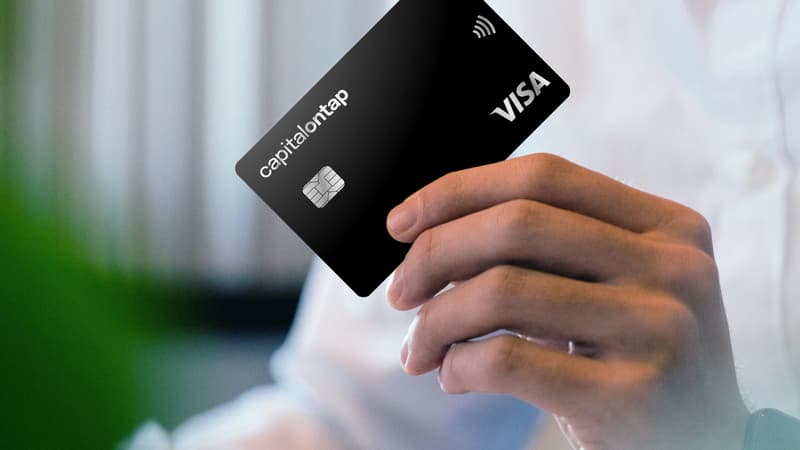Jump to a section
Timing is everything in the business world, and knowing when to make pivotal financial moves can be the difference between success and struggle. One such move is deciding when to apply for a business credit card. Whether you're a seasoned entrepreneur or just launching your startup, the crucial question is when.
In this blog, we'll put a spotlight on the key factors that signal the perfect time to apply for a business credit card. From the importance of maintaining a solid credit score to the necessity of separating personal and business expenses, we'll guide you through the critical junctures where a business credit card can make all the difference. We'll also offer tips for a seamless application process.
But the heart of the matter lies in recognising those 'when' moments. This is where your business can truly benefit from a business credit card. Enhanced cash flow, simplified expense tracking, lucrative rewards, credit building, and more await you once you've nailed the timing.
Key takeaways
- Applying for a business credit card when you have a good or excellent credit score can help secure more favourable terms and enhance your business credit over time.
- A business credit card makes it easier to separate your personal and business expenses. Apply when you’re ready to make tax filing easier.
- Apply for a business credit card when you need to make large business purchases as using a business credit card allows you to earn rewards, gain purchase protection, and protect your business finances.
- When you’re ready to apply for a business credit card, do your research by checking fees, reading all the details, and making sure you meet the requirements.
When to apply for a business credit card: key factors
Timing is crucial when considering whether to apply for a business credit card. Here are some key factors to help you determine the right moment to seek a business credit card for your company:
When you have a good or excellent credit score
There are two types of credit score: personal and business. Personal credit is your score as an individual. It's based on things like paying your household or personal bills on time, the amount of personal loans or credit cards you have, and your current unpaid debt.
Business credit is different. It's the score and rating for your company, not you as a person.
The main thing to understand is that your business and personal credit files are separate. However, applying for a business credit card can have a big impact on your personal credit score; when you first apply for a business credit card, it might show up as a ‘hard inquiry’ on your personal credit report. If you have a poor personal credit score, you may receive unfavourable terms on your business credit cards, such as high interest rates or a low credit limit. This outcome isn't necessarily negative, though. By using your business credit card responsibly, you can actually enhance your business credit score over time. This improvement can open up more financing options for your business when needed in the future.
When you need to separate your personal and business expenses
When it comes to taxes, it's important to keep your personal and business expenses separate. Mixing them can lead to problems, like errors that might make your tax return invalid and cause hefty fines.
Business credit cards are a great way of keeping your business and personal expenses separate and make submitting your tax return much easier. This reduces the need for accountants to analyse individual expenses and figure out if they are genuine and allows for a much smoother filing process.
A lot of credit card providers offer integration with different accounting platforms so you can easily export your business straight into your accounting tool. Integrate your Capital on Tap Business Credit Card transactions with your favourite accounting software like Xero and QuickBooks for seamless expense management; manually export your transactions or connect via live feed to automatically sync your transactions.
If your employees need to make purchases for the business, certain business credit cards come with an excellent feature: employee cards. These cards give your employees the freedom to buy what they require for their jobs, all while keeping all the transactions conveniently in one place.
With Capital on Tap, you not only get this benefit but also free, unlimited employee cards that come with spend controls. This makes organising your business expenses even more straightforward.
When your business is established and profitable
Lenders want to see that your business has a positive cash flow and is capable of repaying any credit card debt. So, if your business is not profitable, you might find it challenging to obtain a business credit card. And if you do manage to get one, you may receive unfavourable terms and conditions.
For example, you may qualify for a Capital on Tap Business Credit Card if your business has a minimum monthly turnover of £2,000.
It's crucial to ensure that your business has a solid financial foundation and generates revenue before applying for a business credit card. By doing so, you'll increase your chances of approval and have access to credit that can help your business grow.
Before you make a large business purchase
Putting a large purchase on a business credit card is an easy and effortless way to earn rewards. For instance, if you’re about to purchase £250,000 worth of stock, with a 1% cashback credit card, you’d earn £2,500 back instantly - that’s £2,500 you wouldn't have if you paid by debit card or BACS transfer that you can now reinvest in your business to grow even more.
Many business credit cards also offer enhanced purchase protection. Payments are afforded certain protection under Section 75 of the Consumer Credit Act. If the seller has misrepresented their goods/services or breached their contract, you can claim from the credit card provider.
So, if you are making a large purchase, using a business credit card is a smart way to protect your business and its finances while gaining a financial advantage.
When you want to start building your business credit history
If you've been using your personal credit cards for business expenses, making the switch to a business credit card can offer numerous advantages. One of the main advantages is that it helps you start building a distinct credit history for your business, which is essential for securing favourable loans, attracting investors, and establishing trust with suppliers and partners in the long run.
When you want extra rewards or cashback on your purchases
Many business credit cards offer rewards programmes, such as cashback, points, or exclusive discounts. Cashback means getting a percentage of your money back when you use your credit card to buy things. If your credit card offers 1% cashback and you spend £1,000 using the card, you get £10 back. You have various options for using this cashback, but the specific choices can vary depending on your credit provider. For instance, Capital on Tap customers can use their cashback to achieve several benefits, such as reducing their card balance, converting it into cash, exchanging it for airline miles, or capitalising on gift card offers.
If you’re travelling more
When deciding when to apply for a business credit card, your business's travel needs are an important factor to consider. If your business has clients in various locations, both nationally and internationally, having a business credit card with travel rewards can be a game-changer. Use these rewards to offset the costs of airfares, train tickets, hotel stays, and car rentals, making your business travel more affordable and efficient.
If your operating costs are growing
Prices are rising, so it’s likely that your operating costs will if they haven't already. If that’s the case and you need a funding option that can handle your growing needs, now might be the time to apply for a business credit card, such as the Capital on Tap Business Credit Card, which offers credit limits as high as £250,000 and no annual fees, meaning all the rewards you earn can go straight back into your business.
If you have lots of subscriptions
As your business grows, you'll likely rely on more and more software tools and subscriptions. A business credit card can be a helpful tool for managing these subscriptions - especially a business credit card that offers virtual cards. By creating virtual cards for different vendors, you can easily keep track of your expenses and prevent subscription clutter. This not only saves you time but also provides better control over your spending. Plus, it simplifies managing and cancelling subscriptions you no longer need, making your financial management more efficient.
If you need short-term financing
For businesses, cash flow can often be unpredictable, posing challenges during periods of expansion or unexpected expenses.
Business credit cards provide immediate access to funds, bridging the gap between revenue cycles. This enables businesses to seize opportunities, stock inventory, or manage emergencies without the hassle of securing a traditional loan.
What to expect after applying
After applying for a business credit card, you can expect a series of steps and outcomes, which will vary depending on the credit card issuer and your creditworthiness.
Here's what you can generally expect:
Application submission: You'll fill out an application either online or through a paper form, providing information about your business, personal information (as the business owner), and financial details.
Credit check: The credit card issuer will perform a credit check. Some providers will do a search into both your business and personal credit history, while others will just check your business file. This check helps them determine your creditworthiness and the credit limit they may offer you.
Approval or denial: Based on the credit check and your application details, the issuer will decide whether to approve or deny your application. This process can take a few minutes to several weeks, depending on the issuer.
Credit limit determination: If approved, the issuer will set your credit limit based on your creditworthiness and the financial information you provided.
Card delivery: If approved, you'll receive your business credit card in the post. If your credit card offers virtual cards, you can set one up the minute you’re approved. If you're approved for a Capital on Tap account, you can start spending straight away.
Account management: Once you have your business credit card, you'll need to manage your account effectively. This includes making payments on time and monitoring your spending. Many issuers offer online account management tools to help you with this.
Billing cycle: You'll have a billing cycle during which you can make purchases on the card. At the end of each billing cycle, you'll receive a statement showing your charges and the minimum payment due.
Payment: You are responsible for making at least the minimum payment by the due date specified in your statement. It's advisable to pay your balance in full to avoid interest charges. Late payments can lead to penalties and damage your credit score.
Rewards and benefits: Many business credit cards offer rewards, such as cashback, travel miles, or other perks. Take advantage of these benefits to maximise the value of your card.
Reporting to credit bureaus: Your business credit card activity will be reported to credit bureaus. Timely payments and responsible use can help build your business credit profile.
Remember that every credit card issuer has its own policies, terms, and conditions. It's crucial to read and understand the terms of your specific card to avoid any surprises. Additionally, use your business credit card responsibly to help your business build good credit and take advantage of the financial benefits it offers.
Tips for applying for a business credit card
When you decide the time is right to apply for a business credit card, it’s crucial to take a well-informed approach. Here are some key steps to consider before applying:
- Thorough research: Begin by researching the various options available in the market. Take the time to explore the distinctive features and advantages offered by different cards. These may include welcome bonuses, reward programmes, and credit limits.
It’s important to do this research before you apply. Applying for multiple credit cards all at once can negatively impact your credit score if the credit providers perform hard inquiries when you apply. - Examine the fees: Pay close attention to the financial aspects of the card. Analyse annual fees, foreign transaction fees, and interest rates. Ensure that these fees align with your business's financial goals and can be managed effectively.
- Read the fine print: Understanding the intricacies of your card is crucial. Carefully go through the terms and conditions associated with the credit card you're interested in. Look for important elements like Personal Guarantees and credit bureau reporting. This step will help you avoid any unexpected surprises down the road.
- Qualification requirements: Different business credit cards have specific qualifying requirements for applicants. Some may necessitate that your business be registered as a private limited company (Ltd) or a limited liability partnership (LLP), while others are open to sole traders. Before applying, make sure to review the qualification criteria closely to ensure your eligibility.
By following these steps, you can make an informed decision when applying for a business credit card, setting your business up for financial success. If you want to learn more, we've got a blog dedicated to choosing the right credit card for your business!
Benefits of having a business credit card
Once you have the right business credit card for your business, make sure you use it wisely to take advantage of its benefits.
Improved cash flow: Business credit cards can help improve a company's cash flow by allowing for purchases and expenses to be made without using cash on hand.
Expense tracking: Business credit cards provide a convenient way for small business owners to track their expenses, which can simplify bookkeeping and reduce the time spent on accounting tasks.
Rewards: Many business credit cards offer rewards programmes, such as cashback, points, or exclusive discounts. These rewards can add up over time, providing additional benefits for companies.
Credit building: Using a business credit card responsibly can help establish and build a company's credit profile, making it easier to obtain financing in the future.
Employee spending control: Supplementary business credit cards can be issued to employees with pre-set spending limits, allowing for better control over company spending and reducing the risk of overspending.
The bottom line
Before you decide to apply for a business credit card, it's crucial to consider a range of factors. These include your credit score, the need to separate personal and business expenses, the profitability of your business, the size of potential business purchases, building a business credit history, maximising rewards, adapting to increased business travel, managing rising operating costs, and keeping track of multiple subscriptions.
To ensure a smooth application process, remember to conduct thorough research, carefully examine associated fees, read the fine print, and confirm that you meet all the necessary qualification requirements for a business credit card.
If you’re ready to enjoy enhanced cash flow, simplified expense tracking, the potential for rewards, the opportunity to build your business credit profile, and control over employee spending, apply for a Capital on Tap Business Credit Card in under 2 minutes today.
This does not constitute financial advice. For funding advice, please contact your financial advisor or accountant.











